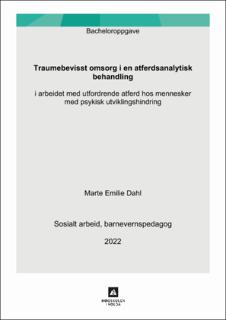| dc.contributor.author | Dahl, Marte Emilie | |
| dc.date.accessioned | 2022-07-21T11:26:40Z | |
| dc.date.available | 2022-07-21T11:26:40Z | |
| dc.date.issued | 2022 | |
| dc.identifier.uri | https://hdl.handle.net/11250/3007516 | |
| dc.description.abstract | Personer med psykisk utviklingshindring har en større risiko enn den generelle befolkningen for å oppleve traumatiske opplevelser og for at dette utvikler seg til PTSD. Samtidig anslås det at nærmere halvparten av personer med psykisk utviklingshindring har utfordrende atferd. Dette gjør at diagnostisk overskygging også er en utfordring blant mennesker med psykisk utviklingshindring, fordi det finnes likheter mellom symptomer på PTSD og symptomer på utfordrende atferd. Traumebevisst omsorg er en tilnærming som er mye brukt blant andre traumeutsatte grupper, men forskning viser at dette ikke er overført til arbeidet med utviklingshindrede. Atferdsanalytisk tilnærming og behandling er mye brukt blant mennesker med psykisk utviklingshindring som har utfordrende atferd. Men dette er også en metode som blir kritisert av andre fagfelt og tar lite høyde for traumer. Denne bacheloroppgaven undersøker hvordan man kan komplementere disse to tilnærmingene og behandlingsmetodene i arbeidet med utfordrende atferd hos personer med psykisk utviklingshindring. Bacheloroppgaven er en teoretisk studie som baserer seg på teori og forskning. Diskusjonen viser noen etiske dilemmaer ved bruken av atferdsanalyse og hvordan man kan forstå traumer hos personer med utviklingshemming. Den viser også hvordan de tre grunnpilarene er gode hjelpemidler for å komplementere traumebevisst omsorg med atferdsanalyse. Konklusjonen i oppgaven er at ved å forstå utfordrende atferd som potensielt uttrykk for traume kan dette føre til en mer nyansert behandling og forebygge avmakt, traumatisering og re-traumatisering. | en_US |
| dc.description.abstract | Abstract
Individuals with developmental disabilities have a greater risk than the general population for experiencing traumatic experiences and also for this to develop into PTSD. At the same time, it is estimated that almost half of the people with developmental disabilities have challenging behavior. This also makes diagnostic overshadowing a challenge among individuals with developmental disabilities, because there are similarities between the symptoms of PTSD and the symptoms of challenging behavior. Trauma-informed care is an approach that is widely used among other trauma-exposed groups, but research shows that this has not been transferred to the work with individuals with developmental disabilities. Behavior analysis approach and treatment is widely used among individuals with developmental disabilities who have challenging behavior. But this is also a method that is criticized and takes little account of trauma. This bachelor thesis examines how to complement these two approaches and treatment methods in the work with challenging behavior in individuals with developmental disabilities. The bachelor thesis is a theoretical study based on theory and research. The discussion shows some ethical dilemmas in the use of behavioral analysis and how to understand trauma in people with developmental disabilities. It also shows how the three pillars are good tools for complementing trauma-informed care with behavioral analysis. The conclusion of the thesis is that by understanding challenging behavior as a potential expression of trauma, this can lead to a more nuanced treatment and prevent powerlessness, traumatization and re-traumatization. | en_US |
| dc.language.iso | nob | en_US |
| dc.publisher | Høgskulen i Volda | en_US |
| dc.title | Traumebevisst omsorg i en atferdsanalytisk behandling i arbeidet med utfordrende atferd hos mennesker med psykisk utviklingshindring | en_US |
| dc.type | Bachelor thesis | en_US |
| dc.source.pagenumber | 34 | en_US |
